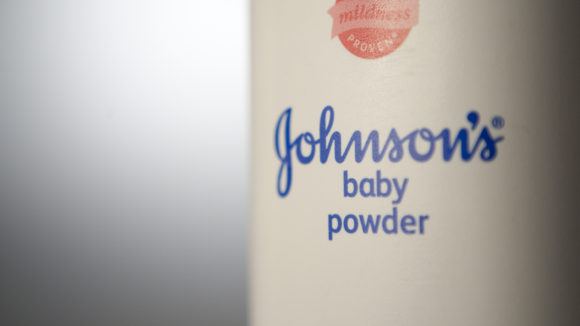Johnson & Johnson persuaded a Missouri appeals court to throw out a $110 million jury award to a woman who said she got cancer from the company’s baby powder. It was the fourth appellate win in the state for J&J, which faces thousands of U.S. damage claims related to the product.
Lois Slemp should not have been allowed to bring her ovarian-cancer lawsuit to trial in St. Louis because she is a resident of Virginia, the intermediate appellate court concluded Tuesday. The court cited the same reasons for throwing out two other baby powder cases, which allege talc in the product was tainted with asbestos.
The decision came the same day J&J officials said there was no need to set aside legal reserves to deal with the more than 15,000 consumer lawsuits targeting its talc-based powders for allegedly causing different kinds of cancer.
“Right now if you think about some of the cases that are out there, they are likely subject to our prevailing on appeal,” J&J CFO Joseph Wolk said on Bloomberg Television.
Ted Meadows, an Alabama lawyer representing Slemp and her family, said he’s planning to ask the Missouri Supreme Court to review the intermediate court’s decision. The high court hasn’t decided whether out-of-state plaintiffs can bring their claims in Missouri.
J&J’s Legal Beating May Only Get Worse with Baby Powder, Opioid, Hip and Other Claims
The trial judge, Rex M. Burlison, had refused in 2017 to throw out Slemp’s verdict, reasoning that evidence showing that J&J used a Missouri-based company to help produce talc-based powders provided proper grounds for the case to be heard in the state.
“The facts are clear — Johnson’s Baby Powder is safe, does not contain asbestos nor does it cause cancer, as reflected in more than 40 years of scientific evidence,” Ernie Knewitz, a company spokesman, said in an emailed statement.
Overturned Verdicts
A trio of talc verdicts handed down by St. Louis juries have been overturned based on a 2017 U.S. Supreme Court ruling, which barred suits by non-resident plaintiffs against non-resident defendant. That ruling was handed down after the jury verdict in favor of Slemp. Before then, Missouri had allowed non-resident plaintiffs to join in litigation with in-state plaintiffs.
“J&J’s strategy of putting a lot of emphasis on appeal seems to be working — at least at the intermediate-appellate court level,” said Carl Tobias, a University of Richmond law professor who teaches about mass-tort cases such as the talc suits. “We’ll see if this strategy holds up at the state supreme-court level.”
Slemp, now 64, said she used J&J’s baby powder and Shower to Shower talc products for more than 40 years before her diagnosis with ovarian cancer in 2012. J&J sold its Shower to Shower brand in 2012 to Valeant Pharmaceuticals International Inc.
Jurors awarded her $5 million in actual damages and $105 million punitive damages over her allegations the talc-based powders caused her ovarian cancer. The verdict was against J&J and Imerys Talc America Inc., which supplied the drugmaker’s talc.
The unit of Paris-based Imerys SA sought bankruptcy protection in February to deal with the thousands of talc suits targeting the company. A judge is overseeing efforts to work out a settlement on the cases.
The case is Slemp v. Johnson & Johnson, No. ED106190, Missouri Court of Appeal, Eastern District (St. Louis)
Related:
- J&J Vows to Overcome Baby Powder, Opioid Liability Claims Against It
- J&J Asks Federal Court to Assume Baby Powder Lawsuits from State Courts
- Johnson & Johnson Facing Justice, SEC Inquiries into Baby Powder Litigation
- Reuters Special Report: J&J Knew About Asbestos in Baby Powder for Decades
- J&J Launches Defense Against Reuters Report on Baby Powder Asbestos
Topics Missouri
Was this article valuable?
Here are more articles you may enjoy.



 Florida Engineers: Winds Under 110 mph Simply Do Not Damage Concrete Tiles
Florida Engineers: Winds Under 110 mph Simply Do Not Damage Concrete Tiles  AIG’s Zaffino: Outcomes From AI Use Went From ‘Aspirational’ to ‘Beyond Expectations’
AIG’s Zaffino: Outcomes From AI Use Went From ‘Aspirational’ to ‘Beyond Expectations’  Jury Finds Johnson & Johnson Liable for Cancer in Latest Talc Trial
Jury Finds Johnson & Johnson Liable for Cancer in Latest Talc Trial  Florida Regulators Crack the Whip on Auto Warranty Firm, Fake Certificates of Insurance
Florida Regulators Crack the Whip on Auto Warranty Firm, Fake Certificates of Insurance 

